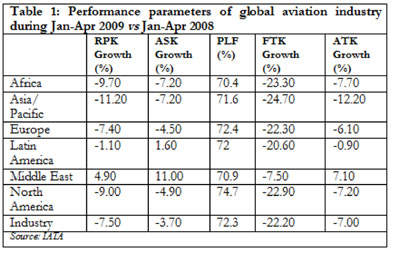 Telling
It Like It Is Telling
It Like It Is
As Summer '09 Begins
We all know now that the global aviation
industry is clearly in a state of deep crisis.
It suffers from falling passenger and cargo
demand, excess capacity, rising fuel bill, and a host of other problems.
Rising fuel prices in the first half of 2008 plus a global recession in
the second half of 2008 wrecked havoc.
Data released by International Air Transport
Association (IATA) shows that revenue passenger kilometer (RPK) declined
by 7.5%; available seat kilometer declined by 3.7%; and passenger load
factor (PLF) was 72.3% during the period Jan-Apr, 2009—as compared
to same period of previous year. Similarly, freight tonne kilometer (FTK)
fell by a huge 22.2%; the available tonne kilometer fell by 7% during
the same period.
Regional performance data indicates that
Asia/ pacific suffered a decline of 11.2% in terms of RPK, and 7.2% decline
in ASK in both Africa and Asia/pacific region during the same period.
Africa plant load factor was very low at 70.4%, closely followed by the
Middle East (70.9%).
 Interestingly, the Middle East was the
only region that recorded any positive growth in terms of passenger traffic.
However, freight traffic performance data indicated that all the regions
recorded declines. The Asia/Pacific region again led with a 24.70% decline
in terms of FTK and a 12.2% decline of ATK during the same period.
Interestingly, the Middle East was the
only region that recorded any positive growth in terms of passenger traffic.
However, freight traffic performance data indicated that all the regions
recorded declines. The Asia/Pacific region again led with a 24.70% decline
in terms of FTK and a 12.2% decline of ATK during the same period.
In India, the effect has been quite severe
on passenger traffic; in the global aviation industry the impact has been
most prominently felt in air cargo traffic. Passenger traffic has declined
from 116.89 million in 2007-08 to 108.88 in 2008-09, which translates
into a decline of 6.9%, according to Airport Authority of India (AAI).
Cargo traffic declined by 1%: from 1.71 million tonnes in 2007-08, to
1.70 million tonnes in 2008-09.
India‘s airport passenger traffic
data indicates that major airports saw declines in passenger traffic and
cargo traffic during 2008-09 as compared to 2007-08. Airports recording
a negative trend in passenger traffic include: Chennai (7.7%), Kolkata
(6.3%), Ahmedabad (10.6%), Trivandrum (7%), Mumbai (9.4%), Delhi (4.7%),
etc. Other airports —like Jodhpur (49.9%), Port Blair (38.2%), Jammu
(26.5%), Rajkot (16.7%), Amritsar (15.55), and Goa (13.9%) —have
also registered declines during this period. Among the factors contributing
to declining air travel was the number one cause: recession dampening
air travel demand, which depressed the numbers of international and domestic
tourists. A decline in air passenger traffic was seen in tourist centers
like Port Blair, Goa, Jodhpur and Amritsar etc. The decline in international
passenger traffic in Goa was 10.3%, Amritsar 2036%, and Gaya 10.7%. Domestic
passenger traffic declined for almost all airports.
 India’s major airports such as Mumbai
(0.7%), Delhi (1.5%), Kolkata (3.1%), Trivandrum (1.6%), Ahmedabad (2.3%)
and Bangalore (11.3%) registered a decline in cargo traffic during 2008-09,
compared with 2007-08. This can perhaps be attributed to the generalized
slow down in international trade.
India’s major airports such as Mumbai
(0.7%), Delhi (1.5%), Kolkata (3.1%), Trivandrum (1.6%), Ahmedabad (2.3%)
and Bangalore (11.3%) registered a decline in cargo traffic during 2008-09,
compared with 2007-08. This can perhaps be attributed to the generalized
slow down in international trade.
IATA forecasts that the cumulative loss
of airlines will be US$9 billion in 2009. Total industry revenue of US$448
billion is projected for 2009—as compared with US$528 billion recorded
in 2008, which means a decline of 15%. Another risk underlined by IATA
is rising fuel prices, which could undermine any possible recovery in
the industry.
According to IATA estimates, the industry
needs US$6 trillion to recapitalize. IATA has however, cautioned that
banks are not able to finance the industry. IATA also points out that
changing business habits, reductions in corporate travel budgets, increased
use of video conferencing —all are dampening industry recovery.
India’s aviation industry is likely
to face a 6.8% fall in demand and 4% fall in capacity in 2009. This will
mainly be due to the rapid deterioration of global economic conditions.
India's international air services, which have increased three-fold between
2000-08, are now expected to witness 2-3% fall in demand, while capacity
may increase 0.7% in 2009.
A wide variety of steps have been undertaken
by airlines to address their problems:
•
Cutting capacity, laying off staff, deferring plane deliveries,
offering special schemes to lure the customers: these are commonly practiced
by airlines. For instance, Jet Airways cut capacity by 12% in 2008. The
CEO of Southwest Airlines, Gary Kelly, voluntarily cut his 2009 base salary
by 10%. Kingfisher Airlines has also cut 20% in the salaries of its pilots.
•
Airlines are working to use new technologies that change the
way planes fly. For instance, the global positioning information enables
shorter, more direct routes to destination. Special landing procedures—such
as continuous descent approaches —reduce fuel to the engines. Recently,
Southwest Airlines conducted a test flight using these technologies. They
found that it could reduce fuel consumption by 6%.
•
Aircraft manufacturers are trying to develop new engines and
lighter weight jetliners, both of which will help save fuel. The plane‘s
design and weight significantly affects the fuel consumption. This is
why the new jetliners—like the C-Series, the Boeing 787 and the
Airbus A350 – are all being manufactured using lighter-than-metal
composite materials.
Although the negative impacts of the current
global recession seem to be unavoidable, the aviation industry is trying
to reduce the severity of the impact. The industry is in survival mode
now, trying to do its best to manage through the current crisis. However,
global economic revival is what will finally hold the key for industry
recovery.
Gordon Feller |



